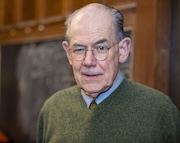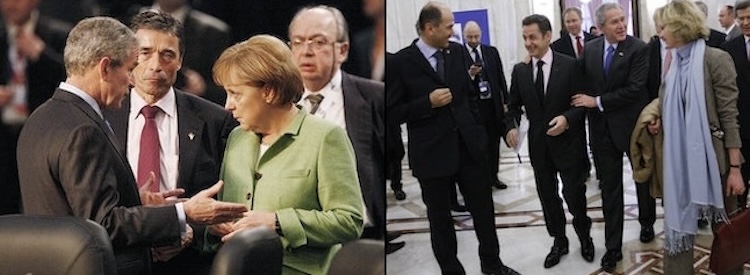By John J. Mearsheimer*
This is part two if excerpts from the article issued by The Transnational, which republished it from Mearsheimer’s Substack page on 5 August 2024. Read part one: Who Caused the Ukraine War? The Conventional Wisdom vs. Incontrovertible Facts — The Editor
CHICAGO, USA | 7 August 2024 (IDN) — Let me shift gears and lay out the three main reasons to think that NATO expansion was the principal cause of the Ukraine war.
FIRST, Russian leaders across the board said repeatedly before the war started that they considered NATO expansion into Ukraine to be an existential threat that had to be eliminated.

UC Political Science Website Photo. Credit: Joe Sterbenc
Putin made numerous public statements laying out this line of argument before 24 February 2022. Speaking to the Defense Ministry Board on 21 December 2021, he stated: “what they are doing, or trying or planning to do in Ukraine, is not happening thousands of kilometers away from our national border. It is on the doorstep of our house. They must understand that we simply have nowhere further to retreat to. Do they really think we do not see these threats? Or do they think that we will just stand idly watching threats to Russia emerge?”
Two months later at a press conference on 22 February 2022, just days before the war started, Putin said: “We are categorically opposed to Ukraine joining NATO because this poses a threat to us, and we have arguments to support this. I have repeatedly spoken about it in this hall.”
He then made it clear that he recognized that Ukraine was becoming a defacto member of NATO. The United States and its allies, he said, “continue to pump the current Kiev authorities full of modern types of weapons.” He went on to say that if this was not stopped, Moscow “would be left with an ‘anti- Russia’ armed to the teeth. This is totally unacceptable.”
Other Russian leaders—including the defense minister, the foreign minister, the deputy foreign minister, and the Russian ambassador to Washington—also stressed the centrality of NATO expansion for causing the Ukraine crisis. Foreign Minister Sergei Lavrov made this point succinctly at a press conference on 14 January 2022: “The key to everything is the guarantee that NATO will not expand eastward.”
One often hears the argument that Russian fears were unfounded because there was no chance that Ukraine would join the alliance in the foreseeable future, if ever.
Indeed, it is said that the United States and its European allies paid little attention to bringing Ukraine into NATO before the war. But even if Ukraine joined the alliance, that would not be an existential threat to Russia because NATO is a defensive alliance. Thus, NATO expansion could not have been a cause of the original crisis, which broke out in February 2014 or the war that began in February 2022.
This line of argument is false. In fact, the Western response to the events of 2014 was to double down on the existing strategy and draw Ukraine even closer to NATO. The alliance began training the Ukrainian military in 2014, averaging 10,000 trained troops annually over the next eight years.
In December 2017, the Trump administration decided to provide Kyiv with “defensive weapons.” Other NATO countries soon got into the act, shipping even more weapons to Ukraine.
Furthermore, Ukraine’s army, navy, and air force began participating in joint military exercises with NATO forces. The West’s effort to arm and train Ukraine’s military explains in good part why it fared so well against the Russian army in the first year of the war.
As a headline in The Wall Street Journal from April 2022 put it, “The Secret of Ukraine’s Military Success: Years of NATO Training.”
Putting aside the alliance’s ongoing efforts to make the Ukrainian military a more formidable fighting force that could operate alongside NATO troops, there was renewed enthusiasm in the West during 2021 for bringing Ukraine into NATO.
At the same time, President Zelensky, who had never shown much enthusiasm for bringing Ukraine into the alliance and who was elected in March 2019 on a platform that called for working with Russia to settle the ongoing crisis, reversed course in early 2021 and not only embraced NATO membership for Ukraine, but also adopted a hardline approach toward Moscow.
President Biden, who moved into the White House in January 2021, had long been committed to bringing Ukraine into NATO and was a super-hawk toward Russia.
Unsurprisingly, on 14 June 2021, NATO issued a communiqué at its annual summit in Brussels, which said: “We reiterate the decision made at the 2008 Bucharest Summit that Ukraine will become a member of the Alliance.”
On 1 September 2021, Zelensky visited the White House, where Biden made it clear that the United States was “firmly committed” to “Ukraine’s Euro-Atlantic aspirations.” Then on 10 November 2021, Secretary of State Antony Blinken, and his Ukrainian counterpart, Dmytro Kuleba, signed an important document—the “US-Ukraine Charter on Strategic Partnership.”
The aim of both parties, the document stated, is to “underscore … a commitment to Ukraine’s implementation of the deep and comprehensive reforms necessary for full integration into European and Euro-Atlantic institutions.” It also explicitly reaffirms the U.S. commitment to the “2008 Bucharest Summit Declaration.”
There appears to be little doubt that Ukraine was well on its way to becoming a member of NATO by the end of 2021.
Even so, some supporters of this policy argue that Moscow should not have been concerned about that outcome, because “NATO is a defensive alliance and poses no threat to Russia.” But that is not how Putin and other Russian leaders think about NATO, and it is what they think that matters. In short, there is no question that Moscow saw Ukraine joining NATO as an existential threat that could not be allowed to stand.
SECOND, a substantial number of influential and highly regarded individuals in the West recognized before the war that NATO expansion—especially into Ukraine—would be seen by Russian leaders as a mortal threat and eventually lead to disaster.
William Burns, who now heads the CIA, but was the US ambassador to Moscow at the time of the April 2008 NATO summit in Bucharest, wrote a memo to then-Secretary of State Condoleezza Rice that succinctly describes Russian thinking about bringing Ukraine into the alliance.
“Ukrainian entry into NATO,” he wrote, “is the brightest of all red lines for the Russian elite (not just Putin). In more than two and a half years of conversations with key Russian players, from knuckle-draggers in the dark recesses of the Kremlin to Putin’s sharpest liberal critics, I have yet to find anyone who views Ukraine in NATO as anything other than a direct challenge to Russian interests.” NATO, he said, “would be seen … as throwing down the strategic gauntlet. Today’s Russia will respond. Russian-Ukrainian relations will go into a deep freeze…It will create fertile soil for Russian meddling in Crimea and eastern Ukraine.”

Burns was not the only Western policymaker in 2008 who understood that bringing Ukraine into NATO was fraught with danger. Indeed, at the Bucharest summit, both German Chancellor Angela Merkel and French President Nicolas Sarkozy opposed moving forward on NATO membership for Ukraine because they understood it would alarm and infuriate Russia. Merkel recently explained her opposition: “I was very sure … that Putin is not going to just let that happen. From his perspective, that would be a declaration of war.”
To take this a step further, numerous American policymakers and strategists opposed President Clinton’s decision to expand NATO during the 1990s, when the decision was being debated. Those opponents understood from the start that Russian leaders would see it as a threat to their vital interests, and that the policy would eventually lead to disaster.
The list of opponents includes prominent establishment figures like George Kennan, both President Clinton’s Secretary of Defense, William Perry, and his Chairman of the Joint Chiefs of Staff, General John Shalikashvili, Paul Nitze, Robert Gates, Robert McNamara, Richard Pipes, and Jack Matlock, just to name a few.
The logic of Putin’s position should make perfect sense to Americans, who have long been committed to the Monroe Doctrine, which stipulates that no distant great power is allowed to form an alliance with a country in the Western Hemisphere and locate its military forces there.
The United States would interpret a move of that sort as an existential threat and go to great lengths to eliminate the danger. Of course, this is what happened during the Cuban Missile Crisis in 1962, when President Kennedy made it clear to the Soviets that their nuclear-tipped missiles would have to be removed from Cuba. Putin is deeply influenced by the same logic. After all, great powers do not want distant great powers moving into their backyard.
THIRD, the centrality of Russia’s profound fear of Ukraine joining NATO is illustrated by two developments that have occurred since the war began.
During the Istanbul negotiations that took place immediately after the invasion began, the Russians made it manifestly clear that Ukraine had to accept “permanent neutrality” and could not join NATO. The Ukrainians accepted Russia’s demand without any serious resistance, surely because they knew that it was otherwise impossible to end the war. More recently, on 14 June 2024, Putin laid out two demands that Ukraine would have to meet before he would agree to a ceasefire and the start of negotiations to end the war. One of those demands was that Kyiv “officially” state “that it abandons its plans to join NATO.”
None of this is surprising, as Russia has always seen Ukraine in NATO as an existential threat that must be prevented at all costs. That logic is the driving force behind the Ukraine war.
Finally, it is obvious from Russia’s negotiating position at Istanbul as well as Putin’s comments on ending the war in his 14 June 2024 address that he is not interested in conquering all of Ukraine and making it part of a greater Russia.
*John J. Mearsheimer is the R. Wendell Harrison Distinguished Service Professor of Political Science at the University of Chicago, where he has taught since 1982. He graduated from West Point in 1970 and then served five years as an officer in the U.S. Air Force. He then started graduate school in political science at Cornell University in 1975. He received his PhD in 1980. He spent the 1979-1980 academic year as a research fellow at the Brookings Institution, and was a post-doctoral fellow at Harvard University’s Center for International Affairs from 1980 to 1982. During the 1998-1999 academic year, he was the Whitney H. Shepardson Fellow at the Council on Foreign Relations in New York. [IDN-InDepthNews]
Image credit: NATO


